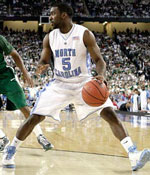One idea my instructors at Johns Hopkins hammer home is the notion that to be a great writer, you need to “read like a writer.” More and more, I see what they mean. I read newspapers and magazines differently these days, dissecting paragraphs and words as I go, noticing small bits of writing technique and style that work well.
 This short Sports Illustrated article on the national champion North Carolina Tar Heels is a good example. I printed it out to read after my Tar Heels won the title, and finally got the chance to read it today. Unlike many articles written about the championship game, this piece by Tim Layden looks beyond the score and tells the story of North Carolina’s season and the different challenges faced by some of its key players. Layden crafts some deft bits of writing in this piece, like this:
This short Sports Illustrated article on the national champion North Carolina Tar Heels is a good example. I printed it out to read after my Tar Heels won the title, and finally got the chance to read it today. Unlike many articles written about the championship game, this piece by Tim Layden looks beyond the score and tells the story of North Carolina’s season and the different challenges faced by some of its key players. Layden crafts some deft bits of writing in this piece, like this:
On the afternoon of the championship game, Lawson was so nervous that he could barely touch his pregame meal of chicken, steak, rice and potatoes. But hours later he went out and devoured Michigan State with a game-high 21 points, eight steals and six assists, with just one turnover
It works well not only because it is witty, but because Layden did his homework to be able to describe, with detail, the meal Lawson couldn’t eat, and contrast it with his stats from the game. Structurally, he builds two lists of four items and runs them parallel to each other.
Layden also does a nice job blending direct observation and reporting with analysis. He shows scenes that lead the reader back to the outcome of the game:
By 11 the next morning Williams and his assistants were huddled in a private room at the team’s hotel, studying video. They cued up Michigan State’s emotional upset of Connecticut, breaking down the Spartans. They did this, as always, with the sound off. A day later they would silence the Spartans more forcefully.
It’s a small thing, but connecting the observation that the UNC coaches studied the game film of the Spartans with the sound down with the way the team silenced the crowd and their opponent the following night is clever. Layden didn’t just report the game like countless other sports writers; he told the story with narrative and metaphor. Just because an article is a sports story doesn’t mean it can’t be good writing. Layden proves that in this piece.